AWM41 985 - [Nurses Narratives] Sister F E James-Wallace
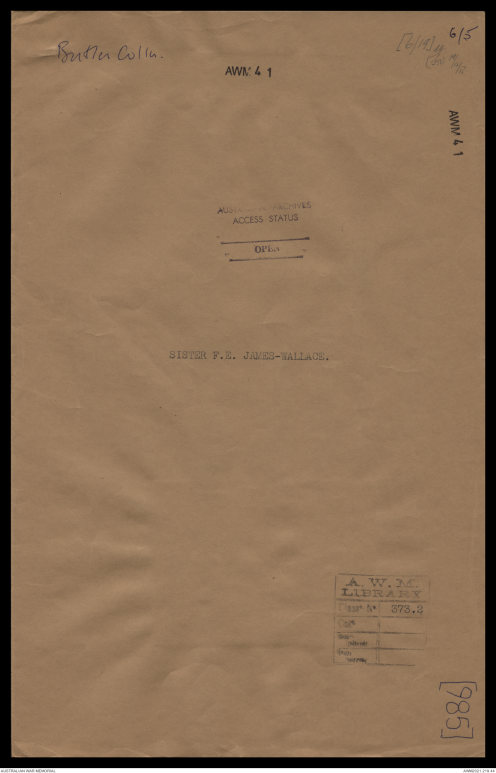
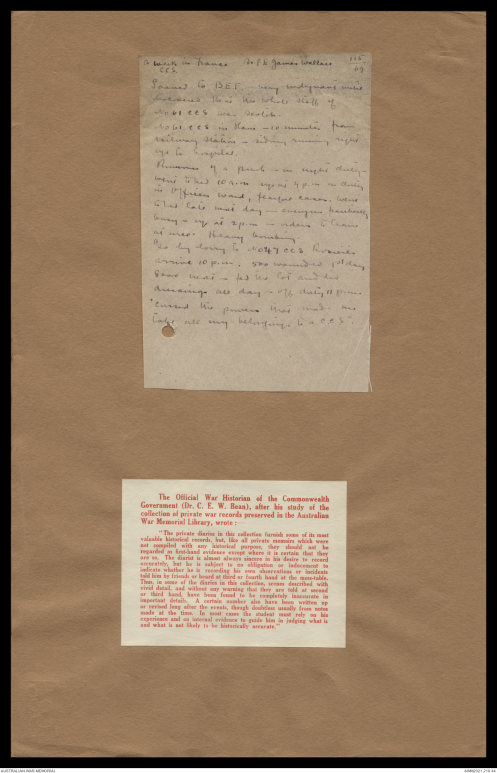
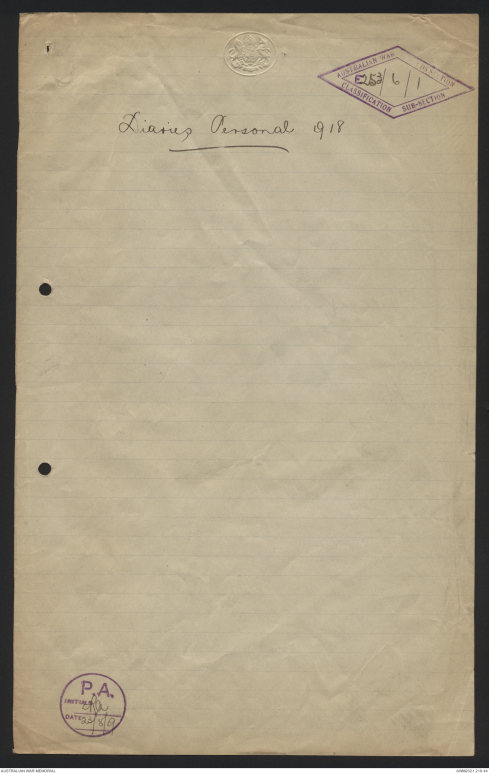
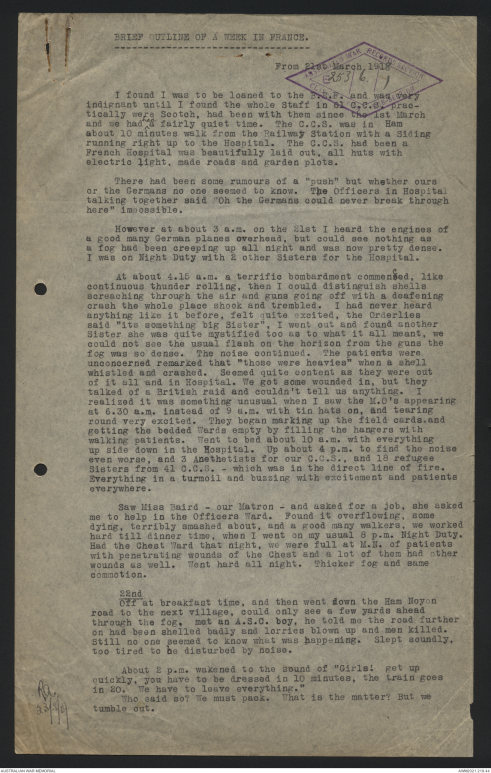
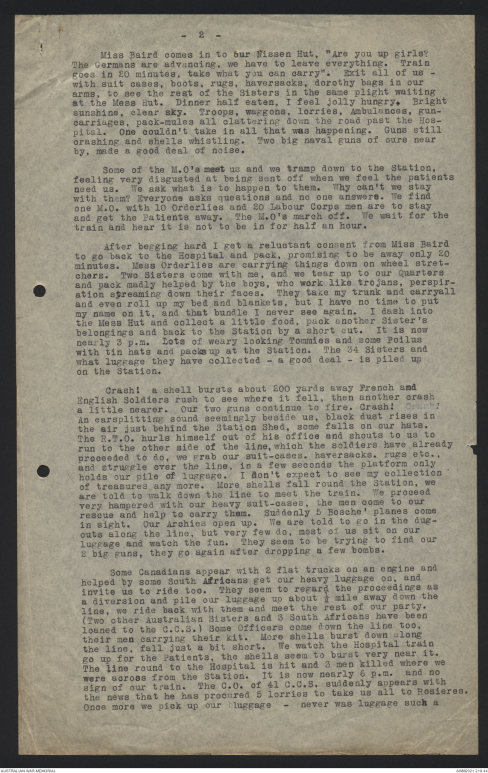
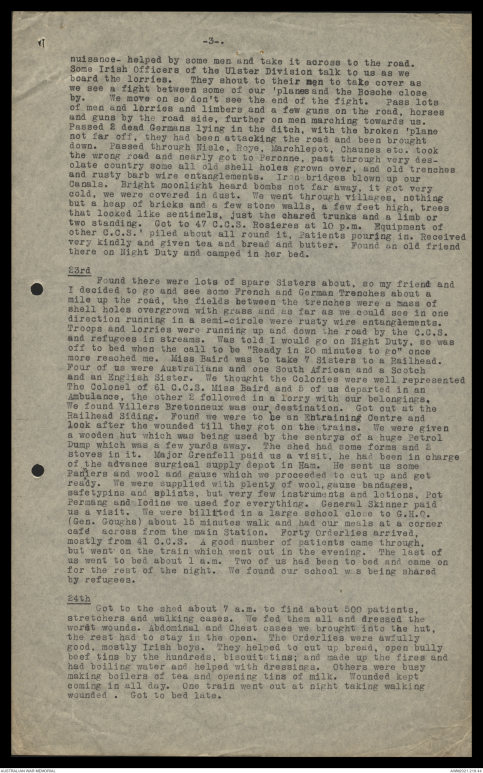
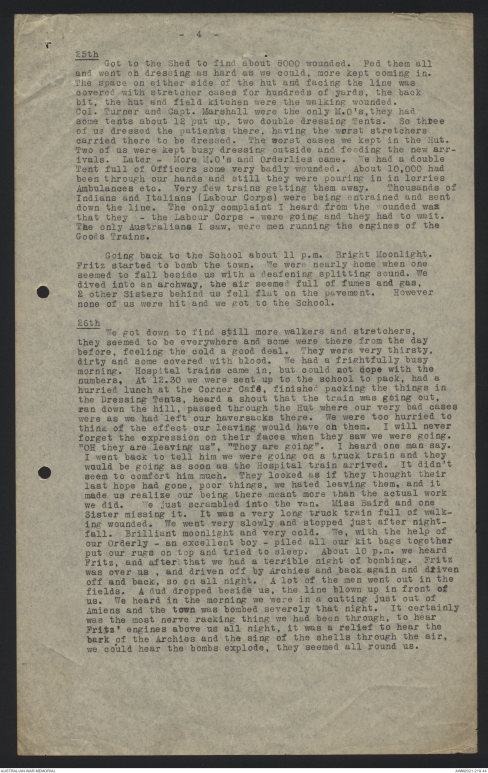
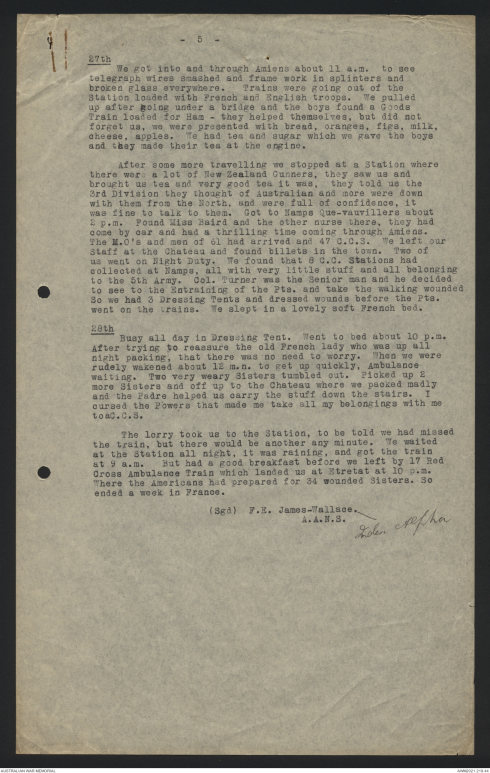
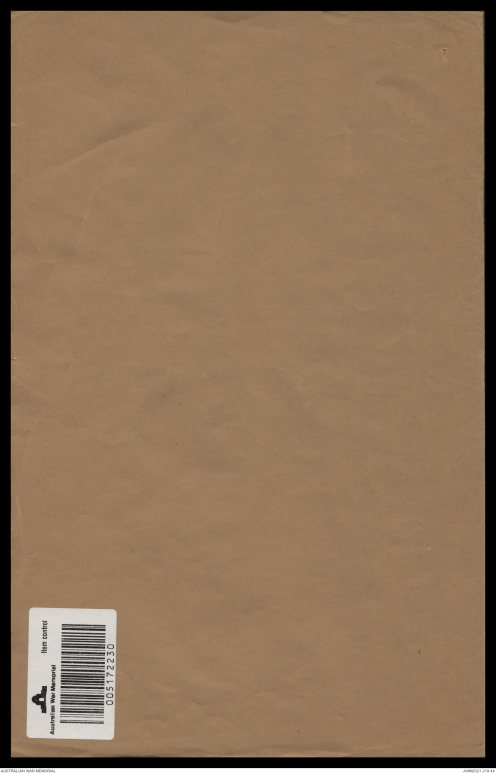
6/5
Butler Colln.
[6/19]
[[On 19/6/18?]]
AWM 4 1
AWM 4 1
AUSTRALIAN ARCHIVES
ACCESS STATUS
OPEN
SISTER F.E. JAMES-WALLACE.
A.W.M.
LIBRARY
Classn No 373.2
[985]
115/69
A week in France Sr F E James-Wallace
CCS.
Loaned to B.E.F. Very indignant until
discovered whole staff of
No 61 CCS were Scotch.
No 61 CCS in Ham - 10 minutes from
railway station - siding running right
up to hospital.
Rumours of a push - on night duty -
went to bed 10 a.m up at 4 p.m. on duty
in Officers Ward, fearful cases . were
Glad late next day - everyone positively
busy - up at 2 p.m - orders to leave
at once. Heavy bombing
Go by lorry to No 47 CCS Rosieres
arrive 10 p.m. 500 wounded 1st day
Good next - fed the lot and did
dressings all day - off duty 11 pm and
cursed the powers that made me
take all my belongings to a C.C.S.
The Official War Historian of the Commonwealth
Government (Dr. C. E. W. Bean), after his study of the
collection of private war records preserved in the Australian
War Memorial Library, wrote:
"The private diaries in this collection furnish some of its most
valuable historical records, but, like all private memoirs which were
not compiled with any historical purpose, they should not be
regarded as first-hand evidence except where it is certain that they
are so. The diarist is almost always sincere in his desire to record
accurately, but he is subject to no obligation or inducement to
indicate whether he is recording his own observations or incidents
told to him by friends or heard at third or fourth hand at the mess-table.
Thus, in some of the diaries in this collection, scenes described with
vivid detail, and without warning that they are told at second
or third hand, have been found to be completely inaccurate in
important details. A certain number also have been written up
or revised long after the events, though doubtless usually from notes
made at the time. In most cases the student must rely on his
experience and on internal evidence to guide him in judging what is
and what is not likely to be historically accurate."
[* AUSTRALIAN WAR RECORDS SECTION
E253/6/1
CLASSIFICATION SUB-SECTION*]
Diaries Personal 1918
[*P.A.
INITIALS RA
DATE 23/8/9*]
[* AUSTRALIAN WAR RECORDS SECTION
E253/6/1
CLASSIFICATION SUB-SECTION*]
BRIEF OUTLINE OF A WEEK IN FRANCE.
From 21st March 1918
I found I was to be loaned to the B.E.F. and was very
indignant until I found the whole Staff in 61 C.C.S. practically
were Scotch, had been with them since the 1st March
and we had ^had a fairly quiet time. The C.C.S. was in Ham
about 10 minutes walk from the Railway Station with a Siding
running right up to the Hospital. The C.C.S. had been a
French Hospital was beautifully laid out, all huts with
electric light, made roads and garden plots.
There had been some rumours of a "push" but whether ours
or the Germans no one seemed to know. The Officers in Hospital
talking together said "Oh the Germans could never break through
here" impossible.
However at about 3 a.m. on the 21st I heard the engines of
a good many German planes overhead, but could see nothing as
a fog had been creeping up all night and was now pretty dense.
I was on Night Duty with 2 other Sisters for the Hospital.
At about 4.15 a.m. a terrific bombardment commensced, like
continuous thunder rolling, then I could distinguish shells
screaching through the air and guns going off with a deafening
crash the whole place shook and trembled. I had never heard
anything like it before, felt quite excited, the Orderlies
said "its something big Sister". I went out and found another
Sister she was quite mystified too as to what it all meant, we
could not see the usual flash on the horizon from the guns the
fog was so dense. The noise continued. The patients were
unconcerned remarked that "those were heavies" when a shell
whistled and crashed. Seemed quite content as they were out
of it all and in Hospital. We got some wounded in, but they
talked of a British raid and couldn't tell us anything. I
realised it was something unusual when I saw the M.O's appearing
at 6.30 a.m. instead of 9 a.m. with tin hats on, and tearing
round very excited. They began marking up the field cards.and
getting the bedded Wards empty by filling the hangers with
walking patients. Went to bed about 10 a.m. with everything
up side down in the Hospital. Up about 4 p.m. to find the noise
even worse, and 3 Anethetists for our C.C.S. and 18 refugee
Sisters from 41 C.C.S. - which was in the direct line of fire.
Everything in a turmoil and buzzing with excitement and patients
everywhere.
Saw Miss Baird - our Matron - and asked for a job, she asked
me to help in the Officers Ward. Found it overflowing, some
dying, terribly smashed about, and a good many walkers, we worked
hard till dinner time, when I went on my usual 8 p.m. Night Duty.
Had the Chest Ward that night, we were full at M.N. of patients
with penetrating wounds of the Chest and a lot of them had other
wounds as well. Went hard all night. Thicker fog and same
commotion.
22nd
Off at breakfast time, and then went down the Ham Noyon
road to the next village, could only see a few yards ahead
through the fog, met an A.S.C. boy, he told me the road further
on had been shelled badly and lorries blown up and men killed.
Still no one seemed to know what was happening. Slept soundly,
too tired to be disturbed by noise.
About 2 p.m. wakened to the sound of "Girls! get up
quickly, you have to be dressed in 10 minutes, the train goes
in 20. We have to leave everything."
Who said so? We must pack. What is the matter? But we
tumble out.
[*RA
23/8/9*]
- 2 -
Miss Baird comes into our Nissen Hut, "Are you up girls?
The Germans are advancing, we have to leave everything. Train
goes in 20 minutes, take what you can carry". Exit all of us -
with suit cases, boots, rugs, haversacks, dorothy bags in our
arms, to see the rest of the Sisters in the same plight waiting
at the Mess Hut. Dinner half eaten, I feel jolly hungry. Bright
sunshine, clear sky. Troops, waggons, lorries, Ambulances, gun-carriages,
pack-mules all clattering down the road past the Hospital.
One couldn't take in all that was happening. Guns still
crashing and shells whistling. Two big naval guns of ours near
by, made a good deal of noise.
Some of the M.O's meet us and we tramp down to the Station,
feeling very disgusted at being sent off when we feel the patients
need us. We ask what is to happen to them. Why can't we stay
with them? Everyone asks questions and no one answers. We find
one M.O. with 10 orderlies and 20 Labour Corps men are to stay
and get the Patients away. The M.O's march off. We wait for the
train and hear it is not to be in for half an hour.
After begging hard I get a reluctant consent from Miss Baird
to go back to the Hospital and pack, promising to be away only 20
minutes. Mess Orderlies are carrying things down on wheel stretchers.
Two Sisters come with me, and we tear up to our Quarters
and pack madly helped by the boys, who work like trojans, perspiration
streaming down their faces. They take my trunk and carryall
and even roll up my bed and blankets, but I have no time to put
my name on it, and that bundle I never see again. I dash into
the Mess Hut and collect a little food, pack another Sister's
belongings and back to the Station by a short cut. It is now
nearly 3 p.m. Lots of weary looking Tommies and some Poilus
with tin hats and packs up at the Station. The 34 Sisters and
what luggage they have collected - a good deal - is piled up
on the Station.
Crash! a shell bursts about 200 yards away French and
English Soldiers rush to see where it fell, then another crash
a little nearer. Our two guns continue to fire. Crash! Crash!
An earsplitting sound seemingly beside us, black dust rises in
the air just behind the Station Shed, some falls on our hats.
The R.T.O. hurls himself out of his office and shouts to us to
run to the other side of the line, which the soldiers have already
proceeded to do, we grab our suit-cases, haversacks, rugs etc.,
and struggle over the line, in a few seconds the platform only
holds our pile of luggage. I don't expect to see my collection
of treasures any more. More shells fall round the Station, we
are told to walk down the line to meet the train. We proceed
very hampered with our heavy suit-cases, the men come to our
rescue and help to carry them. Suddenly 5 Bosche' planes come
in sight. Our Archies open up. We are told to go in the dugouts
along the line, but very few do, most of us sit on our
luggage and watch the fun. They seem to be trying to find our
2 big guns, they go again after dropping a few bombs.
Some Canadians appear with 2 flat trucks on an engine and
helped by some South Africans get our heavy luggage on, and
invite us to ride too. They seem to regard the proceedings as
a diversion and pile our luggage up about ½ mile away down the
line, we ride back with them and meet the rest of our party.
(Two other Australian Sisters and 3 South Africans have been
loaned to the C.C.S.) Some Officers come down the line too,
their men carrying their kit. More shells burst down along
the line, fall just a bit short. We watch the Hospital train
go up for the Patients, the shells seem to burst very near it.
The line round to the Hospital is hit and 3 men killed where we
were across from the Station. It is now nearly 6 p.m. and no
sign of our train. The C.O. of 41 C.C.S. suddenly appears with
the news that he has procured 5 lorries to take us all to Rosieres.
Once more we pick up our luggage - never was luggage such a
-3-.
nuisance - helped by some men and take it across to the road.
Some Irish Officers of the Ulster Division talk to us as we
board the lorries. They shout to their men to take cover as
we see a fight between some of our 'planes and the Bosche close
by. We move on so don't see the end of the fight. Pass lots
of men and lorries and limbers and a few guns on the road, horses
and guns by the road side, further on men marching towards us.
Passed 2 dead Germans lying in the ditch, with the broken 'plane
not far off, they had been attacking the road and been brought
down. Passed through Nisle, Roye, Marchlepot, Chaunes etc. took
the wrong road and nearly got to Peronne, past through very desolate
country some all old shell holes grown over, and old trenches
and rusty barb wire entanglements. Iron bridges blown up our
Canals. Bright moonlight heard bombs not far away, it got very
cold, we were covered in dust. We went through villages, nothing
but a heap of bricks and a few stone walls, a few feet high, trees
that looked like sentinels, just the chared trunks and a limb or
two standing. Got to 47 C.C.S. Rosieres at 10 p.m. Equipment of
other C.C.S.' piled about all round it, Patients pouring in. Received
very kindly and given tea and bread and butter. Found an old friend
there on Night Duty and camped in her bed.
23rd
Found there were lots of spare Sisters about, so my friend and
I decided to go and see some French and German Trenches about a
mile up the road, the fields between the trenches were a mass of
shell holes overgrown with grass and as far as we could see in one
direction running in a semi-circle were rusty wire entanglements.
Troops and lorries were running up and down the road by the C.C.S.
and refugees in streams. Was told I would go on Night Duty, so was
off to bed when the call to be "Ready in 20 minutes to go" once
more reached me. Miss Baird was to take 7 Sisters to a Railhead.
Four of us were Australians and one South African and a Scotch
and an English Sister. We thought the Colonies were well represented
The Colonel of 61 C.C.S. Miss Baird and 5 of us departed in an
Ambulance, the other 2 followed in a lorry with our belongings.
We found Villers Bretonneux was our destination. Got out at the
Railhead Siding. Found we were to be an Entraining Centre and
look after the wounded till they got on the trains. We were given
a wooden hut which was being used by the sentrys of a huge Petrol
Dump which was a few yards away. The shed had some forms and 2
stoves in it. Major Grenfell paid us a visit, he had been in charge
of the advance surgical supply depot in Ham. He sent us some
Pan^niers and wool and gauze which we proceeded to cut up and get
ready. We were supplied with plenty of wool, gauze bandages,
safetypins and splints, but very few instruments and lotions. Pot
Permang and Iodine we used for everything. General Skinner paid
us a visit. We were billeted in a large school close to G.H.Q.
(Gen. Goughs) about 15 minutes walk and had our meals at a corner
cafe across from the main Station. Forty Orderlies arrived
mostly from 41 C.C.S. A good number of patients came through,
but went on the train which went out in the evening. The last of
us went to bed about 1 a.m. Two of us had been to bed and came on
for the rest of the night. We found our school was being shared
by refugees.
24th
Got to the shed about 7 a.m. to find about 500 patients,
stretchers and walking cases. We fed them all and dressed the
worst wounds. Abdominal and Chest cases we brought into the hut,
the rest had to stay in the open. The Orderlies were awfully
good, mostly Irish boys. They helped to cut up bread, open bully
beef tins by the hundreds, biscuit tins; and made up the fires and
had boiling water and helped with dressings. Others were busy
making boilers of tea and opening tins of milk. Wounded kept
coming in all day. One train went out at night taking walking
wounded . Got to bed late .
- 4 -
25th
Got to the Shed to find about 5000 wounded. Fed them all
and went on dressing as hard as we could, more kept coming in.
The space on either side of the hut and facing the line was
covered with stretcher cases for hundreds of yards, the back
bit, the hut and field kitchen were the walking wounded.
Col. Turner and Capt. Marshall were the only M.O's. they had
some tents about 12 put up, two double dressing Tents. So three
of us dressed the patients there, having the worst stretchers
carried there to be dressed. The worst cases we kept in the Hut.
Two of us were kept busy dressing outside and feeding the new arrivals.
Later - More M.O's and Orderlies came. We had a double
Tent full of Officers some very badly wounded. About 10,000 had
been through our hands and still they were pouring in in lorries
Ambulances etc. Very few trains getting them away. Thousands of
Indians and Italians (Labour Corps) were being entrained and sent
down the line. The only complaint I heard from the wounded was
that they - the Labour Corps - were going and they had to wait.
The only Australians I saw, were men running the engines of the
Goods Trains.
Going back to the School about 11 p.m. Bright Moonlight.
Fritz started to bomb the town. We were nearly home when one
seemed to fall beside us with a deafening splitting sound. We
dived into an archway, the air seemed full of fumes and gas,
2 other Sisters behind us fell flat on the pavement. However
none of us were hit and we got to the School.
26th
We got down to find still more walkers and stretchers,
they seemed to be everywhere and some were there from the day
before, feeling the cold a good deal. They were very thirsty,
dirty and some covered with blood. We had a frightfully busy
morning. Hospital trains came in, but could not cope with the
numbers. At 12.30 we were sent up to the school to pack, had a
hurried lunch at the Corner Cafe, finished packing the things in
the Dressing Tents, heard a shout that the train was going out,
ran down the hill, passed through the Hut where our very bad cases
were as we had left our haversacks there. We were too hurried to
think of the effect our leaving would have on them. I will never
forget the expression on their faces when they saw we were going.
"OH they are leaving us", "They are going". I heard one man say.
I went back to tell him we were going on a truck train and they
would be going as soon as the Hospital train arrived. It didn't
seem to comfort him much. They looked as if they thought their
last hope had gone, poor things, we hated leaving them, and it
made us realize our being there meant more than the actual work
we did. We just scrambled into the van. Miss Baird and one
Sister missing it. It was a very long truck train full of walking
wounded. We went very slowly and stopped just after nightfall.
Brilliant moonlight and very cold. We, with the help of
our Orderly - and excellent boy - piled all our kit bags together
put our rugs on top and tried to sleep. About 10 p.m. we heard
Fritz, and after that we had a terrible night of bombing. Fritz
was over us, and driven off by Archies and back again and driven
off and back, so on all night. A lot of the men went out in the
fields. A dud dropped beside us, the line blown up in front of
us. We heard in the morning we were in a cutting just out of
Amiens and the town was bombed severely that night. It certainly
was the most nerve racking thing we had been through, to hear
Fritz' engines above us all night, it was a relief to hear the
bark of the Archies and the sing of the shells through the sir,
we could hear the bombs explode, they seemed all round us.
- 5 -
27th
We got into and through Amiens about 11 a.m. to see
telegraph wires smashed and frame work in splinters and
broken glass everywhere. Trains were going out of the
Station loaded with French and English troops. We pulled
up after going under a bridge and the boys found a Goods
Train loaded for Ham - they helped themselves, but did not
forget us, we were presented with bread, oranges, figs, milk,
cheese, apples. We had tea and sugar which we gave the boys
and they made their tea at the engine.
After some more travelling we stopped at a Station where
there were a lot of New Zealand Gunners, they saw us and
brought us tea and very good tea it was, they told us the
3rd Division they thought of Australian and more were down
with them from the North, and were full of confidence, it
was fine to talk to them. Got to Namps Que-vauvillers about
2 p.m. Found Miss Baird and the other nurse there, they had
come by car and had a thrilling time coming through Amiens.
The M.O's and men of 61 had arrived and 47 C.C.S. We left our
Staff at the Chateau and found billets in the town. Two of
us went on Night Duty. We found that 8 C.C. Stations had
collected at Namps, all with very little stuff and all belonging
to the 5th Army. Col. Turner was the Senior man and he decided
to see to the Entraining of the Pts. and take the walking wounded
So we had 3 Dressing Tents and dressed wounds before the Pts.
went on the trains. We slept in a lovely soft French bed.
28th
Busy all day in Dressing Tent. Went to bed about 10 p.m.
after trying to reassure the old French lady who was up all
night packing, that there was no need to worry. When we were
rudely wakened about 12 m.n. to get up quickly, Ambulance
waiting. Two very weary Sisters tumbled out. Picked up 2
more sisters and off up to the Chateau where we packed madly
and the Padre helped us carry the stuff down the stairs. I
cursed the Powers that made me take all my belongings with me
to aC.C.S.
The lorry took us to the Station, to be told we had missed
the train, but there would be another any minute. We waited
at the station all night, it was raining, and got the train
at 9 a.m. But had a good breakfast before we left by 17 Red
Cross Ambulance Train which landed us at Etretat at 10 p.m.
Where the Americans had prepared for 34 wounded Sisters. So
ended a week in France.
(Sgd) F.E. James-Wallace.
A.A.N.S.
[*Index Alpha*]
[*Australian War Memorial
Item control
005172230*]
 Diane Ware
Diane WareThis transcription item is now locked to you for editing. To release the lock either Save your changes or Cancel.
This lock will be automatically released after 60 minutes of inactivity.